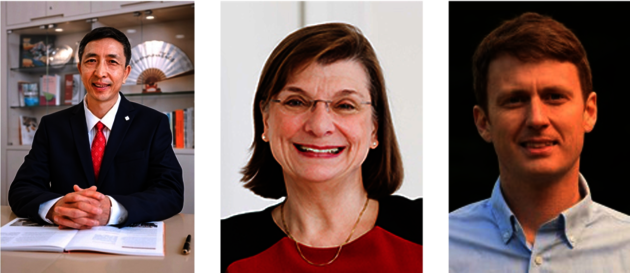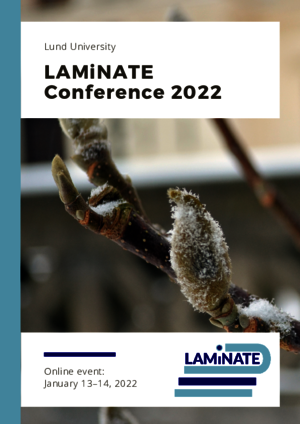LAMiNATE Conference 2022
In order to celebrate its first year, the LAMiNATE research platform organized an online, scientific conference held on January 13–14, 2022.
The academic programme consisted of presentations by three invited keynote speakers and the by local LAMiNATE members. Download the full program here. Our keynote speakers were Ping Li, Elizabeth Lanza and Luke Plonsky.

Keynote 1: Luke Plonsky
Quantiously Optimistic: On the State of Quantitative Methods in the Applied Language Sciences
Methods matter. This is obvious, I know. But it wasn’t until fairly recently that we as a field began to reflect on and systematically examine our methodological practices (see Gass et al., 2021). This work has led to real progress on fronts ranging from sampling and design to data analysis, researcher training, and open science (e.g., Marsden & Plonsky, 2018; Norouzian, 2020; Sudina, 2021; Veríssimo, 2021). But we’re not out of the woods yet. In this talk, I discuss several major methodological challenges we face as well as several advances—the “methodological turn”, as Heidi Byrnes (2013) put it—that has been taking place in recent years. In particular, I’ll address the need for stronger validity arguments behind our instruments, and I will encourage a healthy skepticism toward quantitative approaches which (still) dominate in the field. I will also explain why, despite these concerns and reservations, I am generally (if cautiously) optimistic about the future of research methods in the applied language sciences.
Keynote 2: Ping Li
Digital Language Learning (DLL): Insights from Behavior, Cognition, and the Brain
How can we leverage digital technologies to enhance second language learning and bilingual representation? In the era of pervasive digital applications, our theories and practices for the learning and teaching of L2 lag significantly behind the pace of scientific advances and technological innovations. In this talk, I outline the approach of digital language learning (DLL) for L2 acquisition and representation, and provide a theoretical synthesis and analytical framework with respect to DLL’s current and future promises. Theoretically, based on findings from learner behaviors, cognitive abilities, and brain correlates, the DLL approach serves as the basis for understanding differences between child language learning and adult L2 learning, and for understanding the nature of learning context and learner differences. Practically, DLL studies can inform pedagogical designs and L2 instructional practices, providing new tools and platforms for multilingual communication and intercultural adaptation. Finally, because of its highly interdisciplinary nature, DLL also serves to integrate cognitive science and linguistics with emerging technologies including AI and data analytic applications in education.
Keynote 3: Elizabeth Lanza
Children’s learning of more than one language in the family: Policies and practices, input and experience
With increased transnational migration in recent years, raising children with more than one language has become more and more common as people cross borders, integrate into new cultural-linguistic landscapes, form intermarriages and partnerships, and create multilingual families. The family as a context for the child’s learning of language(s) has been addressed from various epistemological approaches. Developmental psycholinguistics has held a long tradition in studying children’s language acquisition in the home with a more recent focus on input and experience. On the other hand, sociolinguistics has increasingly turned its attention to children’s language learning in the home through the burgeoning field of family language policy, which draws especially on theoretical frameworks of language policy, language socialization, literacy studies as well as child language acquisition. The field has on the whole drawn on a myriad of methods with an increasing use of ethnography and digital media. In my presentation, I will present developments in the field of family language policy from its earlier emphasis on the question of what (socio)linguistic environments are conducive to the learning of two or more languages in the family to more critical perspectives on family, identity and ideology. In my talk, I will project my own vision for the future of this research domain, including a discussion of how and why we as researchers should reach out across disciplines in our attempts to gain understanding of why some children who are exposed to more than one language in the home actually speak those languages, while others do not.

